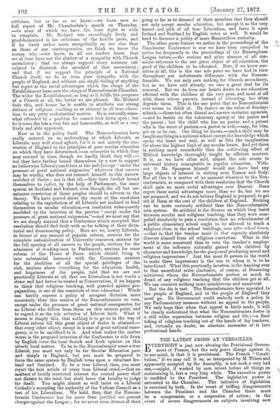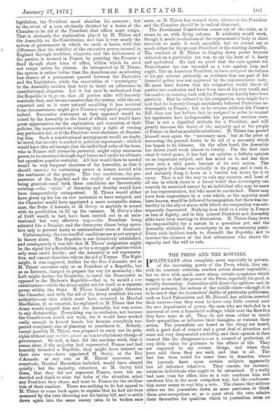THE LATEST CRISIS AT VERSAILLES.
.EVERYBODY is just now abusing the Provisional Govern- ment of France, but the only grave charge against it, to our mind, is that it is provisional. The French " Consti- tution," if we may call it so, as interpreted by M. Thiers and apparently accepted by the Assembly, is not such a very bad one,—might, if worked by men intent before all things on maintaining it, last a very long while. The executive power is confided to the President. The legislative power is
entrusted to the Chamber. The initiative of legislation is exercised by both. In the event of trifling disagreements between the President and the Chamber there must be a compromise, or a suspension of action ; in the event of severe disagreements on subjects involving new legislation, the President must abandon his measure ; but in the event of a vote obviously dictated by a desire of the Chamber to be rid of the President, that officer must resign. That is obviously the explanation placed by M. Thiers and the Assembly on the Constitution, and that is very nearly the system of government in which we exult at home, with this difference, that the stability of the executive power, secured in England through tradition, etiquette, and the forbearance of the parties, is secured in France by granting the Premier a fixed though short term of office, within which he need not resign unless he pleases. As interpreted by M. Thiers, the system is rather better than the American one, as allowing less chance of a permanent quarrel between the Executive and the Legislature, while the reservation of " sovereignty " to the Assembly enables that body to insist on adherence to constitutional etiquette. Let it but once be understood that the Republic is to go on, that all parties alike will honestly maintain that, and we can conceive that the system, with the un- expected and as it were natural moulding it has received from circumstances, might give France a very good government indeed. Successive statesmen as they appeared would be raised by the Assembly to the head of affairs, and would have great opportunites for the explanation and execution of their policies, the representatives retaining only a right of vetoing any particular act, or if the President were obstinate, of dismiss- ing him. Such a constitutional arrangement would, no doubt, be novel, but novelty is needed in political experiment ; while it would have this advantage, that the individual ruler of the hour, who in France will always be powerful, might enjoy enormous power, to be exercised through legal forms and under an ultimate but operative popular restraint. All that would then be needed would be very frequent elections of the Assembly, so that it should exercise its restraining power in honest accord with the sentiment of the people. The two conditions, the per- manence of the Republic and the reality of representation, being granted—and both these conditions are theoretically existing,—the " crisis " of Saturday and Sunday would have been comparatively unimportant. M. Thiers would either have given up his tax on raw materials or have resigned, and the Chamber would have appointed a more acceptable states- man, the Duke d'Aumale, or M. Grevy, or anybody in accord with its proclivities, to fill up the vacancy. M. Grevy's idea of 1849 would, in fact, have been carried out in an unin- tentional but very effective way,—the President being selected like a Premier, and the three-year clause being opera- tive only to prevent hasty or unintentional votes of dismissal.
Unfortunately, the two needful conditions are as yet accepted in theory alone. The Republic is not definitively established, and consequently it was felt that M. Thiers' resignation might be the signal for a Revolution, or for a struggle of parties which only arms could decide ; and the Assembly is not representa- tive, and cannot therefore rely on the aid of France. The Right might, it was supposed, declare for the Due d'Aumale, not as M. Thiers' successor only, or as President of a Republic, but as an Interrex, charged to prepare the way for monarchy ; the Left might declare for Gambetta, to instal the Democratic as opposed to the Moderate Republic—that is, to mould a new constitution—while the Army might act for itself as a separate power within the State. M. Thiers himself might threaten the Chamber, and with the aid of the Army establish his own authority—an idea which must have occurred to Marshal MacMahon, if, as reported, he explained to M. Thiers that the Army would support him and the Assembly, but was averse to any dictatorship. Everything was in confusion, not because the Constitution would not work, for it would have worked easily enough in honest hands, but because everybody sus- pected everybody else of planning to overthrow it. Nobody, except possibly M. Thiers, was prepared to carry out its prin- ciples without any arrire pense'e as to a revolutionary change of government. So well, in fact, did the machine work, that it seems clear, if the majority had represented France and had honestly intended a Republic, they might have insisted on their own way—have appointed M. Grevy, or the Duo d'Aumale, or any one, as M. Thiers' successor, and everybody, Marshal Macmahon included, would have obeyed quietly ; but the majority, conscious, as M. Grevy told them, that they did not represent France, were too un- decided and timid to seize the helm of the situation, select any President they chose, and trust to France for the ratifica' tion of their conduct. There was nothing to do but appeal to M. Thiers to come back again, to explain that he had not been menaced by the vote throwing out his taxing bill, and to settle down again into the same uneasy calm, to be broken once more, as M. Thiers has warned them, whenever the President and the Chamber should be in radical disaccord.
The Provisional Constitution comes out of the crisis, as it seems to us, with flying colours. It evidently would work, though it needs re-elections of the representative body at short intervals to make it work smoothly, but we cannot say as much either for the present President or the existing Assembly. The conduct of M. Thiers in flinging down power because defeated on a particular tax was, to say the least of it, hasty and egotistical. He had no proof that the vote against his Protectionist tax was intended as a vote against him, and ought, like an American President, to have accepted the failure of his pet scheme patiently, as evidence that one part of his financial policy was not approved by the representative body. He must have known that his resignation would throw all parties into confusion and have been sure of his own recall, and his motive in running such risk for France can hardly have been patriotic. Had he adhered to his resignation, men might have said that he honestly though mistakenly believed Protection in- dispensable to France ; but as he returns without his Finance Bill, they can but believe that he resigned in order to remind his opponents how indispensable his personal services were. That is not a dignified attitude for a President, and will greatly increase the desire of the majority and of the people of France to find an available substitute. M. Thiers has proved• himself once again the "necessary man," but at the price of increasing the general desire to be rid of a necessity which has begun to be irksome. On the other hand, the Assembly has shown itself weak almost to fatuity. For the first time since it voted peace, it has had an opinion, a definite opinion on an important subject, and has acted on it, and has then gone into a wild panic because of its own action. The sovereignty it claims was actually in its grasp, and it took it, and instantly flung it down as a burden too heavy for it to carry. That is not the way to rule any country, and least of all one in which there is a latent belief that sovereignty can scarcely be exercised except by an individual who may be more or less representative, but who must be unchecked. There may have been imprudence in a vote which, as the majority must have known, would be followed byresignation, but there was im- becility in the abject alarm with which the resignation was sub- sequently deprecated. Nothing is so fatal to a ruler in France as loss of dignity, and in this quarrel President and Assembly alike have been wanting to themselves. M. Thiers flung down his responsibility for a nation in a querulous pet, and the Assembly abdicated its sovereignty in an unreasoning panic. Every such incident tends to discredit the Republic, and to increase the chances of the first adventurer who shows the capacity and the will to rule.



































 Previous page
Previous page